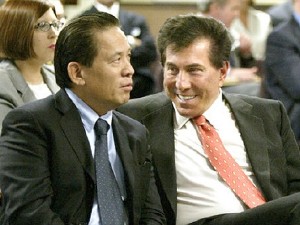MANILA, Philippines—The group of Japanese pachinko mogul Kazuo Okada has gone to a Philippine court and filed a criminal complaint against erstwhile Las Vegas casino partner Stephen Wynn, accusing him of libel over allegations of improper payments.
Tiger Resort Leisure and Entertainment Inc., local unit of Okada’s gaming firm Universal Entertainment Corp., filed the case against the chair of Wynn Resorts on Thursday at the office of the city prosecutor of Parañaque City, where Tiger holds office.
Tiger Resort is the operating company of the Manila Bay Resorts project in Entertainment City in Parañaque. It has been granted a provisional license to operate a $2-billion casino that it is developing on Manila Bay.
Universal is Japan’s largest maker of pachinko gaming machines. Pachinko is a game similar to pinball and slot machines. A player fires balls into the machine, which run through a series of pins. Getting balls into certain combinations of slots results in a win.
The lawsuit is the latest twist in a nearly yearlong quarrel between Okada and Wynn. They have sued each other in the United States, and Okada has filed a defamation suit against his former partner in Japan.
Wynn, in a statement, said the lawsuit was just the latest in a series of desperate actions by Okada.
‘Desperate campaign’
“This ridiculous, and spurious action is just the latest baseless threat in Mr. Okada’s increasingly desperate campaign to divert public attention from his deepening legal troubles in multiple jurisdictions,” Wynn said in the e-mailed statement.
In February, Wynn stripped Okada of a 20-percent shareholding in Wynn Resorts through Okada’s US subsidiary, Aruze. Wynn Resorts said Okada was unsuitable to continue as a board member after an internal investigation alleged Okada appeared to have violated US anticorruption laws through payments it had made.
The Okada group said the case against Wynn was for “defamation, damage to credit and other harm as a result of the press release posted by Wynn Resorts on its official website.”
In a press statement, the group said it was in dispute with Wynn because of Okada’s opposition to an anomalous $135-million donation pledged by a subsidiary of Wynn Resorts in Macau.
“Mr. Okada’s actions did not sit well with respondent, as the latter feared that an investigation would reveal that the purpose for the huge donation in Macau was improper and illegal,” the group said.
It added: “This prompted respondent Wynn to use the Philippine project as a pretext to eliminate and take over Mr. Okada’s stockholdings (through Universal Entertainment Corp. and Aruze USA Inc.) and remove him from Wynn Resorts.”
Freeh report
A previous board meeting of Wynn Resorts determined that Okada and his companies must have engaged in corrupt activities in connection with the Philippine project, based on the supposition that “the Philippines is a corrupt country.”
Wynn then hired a former head of the Federal Bureau of Investigation, Louis Freeh, to conduct an investigation of the alleged corrupt activities of Okada and his companies.
“The investigation was clearly an afterthought and was commissioned for the purpose of providing justification for the baseless findings of the compliance committee,” the Okada group said in a statement.
The Freeh report alleged that Okada had made improper cash payments and gave gifts totaling about $110,000 to gaming regulators, including those in the Philippines. It also alleged that Filipino regulators were given dinners, Chanel bags and suites at Wynn Macau, all courtesy of Okada.
Reckless attack
The Okada complaint said the Freeh report was “inaccurate and incomplete and prepared with undue haste.”
The complaint also said Wynn’s actions were an “attack” on “the integrity” of the Republic of the Philippines, President Aquino and other Philippine government officials. It said, “Respondent recklessly and maliciously imputed in public that the Philippines is a corrupt country.”
Defending the Philippines, the Okada complaint said the Philippines “has been properly governed as a democratic country by President Aquino, whose father was a democratic activist, under a strong anticorruption campaign.”
Entertainment City
Universal Entertainment, through subsidiary Tiger, broke ground on Jan. 26 at the 12-hectare Entertainment City on Manila Bay that the Philippine government hopes will become Manila’s answer to the Las Vegas strip.
Okada’s group and three others were awarded by state-owned Philippine Amusement and Gaming Corp. (Pagcor) with a contract to build a hotel-resort complex in Entertainment City during the incumbency of Efraim Genuino, Pagcor chair during the Arroyo administration.
Okada is now invoking the Philippines’ existing penal code to run after Wynn, noting that the primer on cybercrime issued by the Department of Justice on Nov. 26 provided that “as of the moment, cybercrime-related cases are dealt with using existing laws.”
This means that “Internet libel may be dealt with or prosecuted” under the existing provisions of the Revised Penal Code on libel, the Okada complaint said.
The complaint added that all four elements of libel as defined under local laws were present in the case—imputation of a discreditable act or condition to another, publication of the imputation, identity of the person defamed and existence of malice.
Flawed investigation
The Okada complaint deplored the “serious flaws and defects” in the Freeh investigation, adding that its conclusions were “tentative, incomplete and uncertain, indicating that they lack any solid basis for such reckless and malicious accusations.”
As such, it claimed there was a plot to “publicly and maliciously” attack Okada, Tiger, Universal and Aruze and tarnish their reputation. With a report from Reuters


